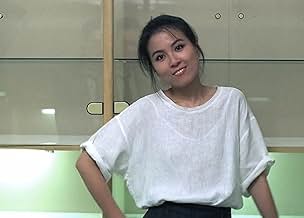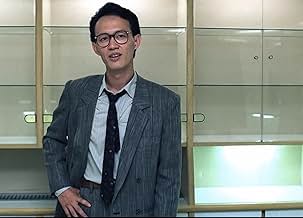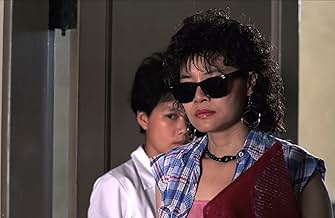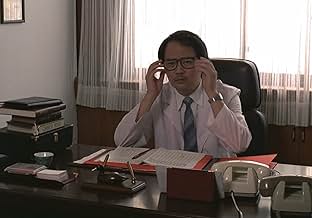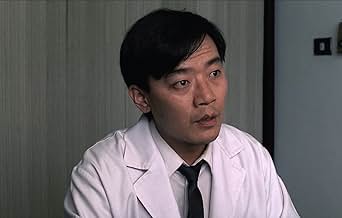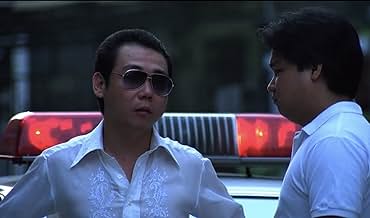NOTE IMDb
7,7/10
5,9 k
MA NOTE
Un mystère métaphysique sur la vie de trois couples à Taipei qui se croisent continuellement pendant plusieurs semaines.Un mystère métaphysique sur la vie de trois couples à Taipei qui se croisent continuellement pendant plusieurs semaines.Un mystère métaphysique sur la vie de trois couples à Taipei qui se croisent continuellement pendant plusieurs semaines.
- Réalisation
- Scénario
- Casting principal
- Récompenses
- 4 victoires et 2 nominations au total
Li-Chun Lee
- Li Lizhong
- (as Lichun Lee)
Yu An-Shun
- Da Shun
- (as An-Shun Yu)
Avis à la une
There's an interesting visual grammar at work in The Terrorizers, consisting of its approach to framing, movement, and pacing. The film is one of the better demonstrations of how images can serve as the basis of a conceptually rich experience. People and objects, because of how they're framed, because of the moment at which we encounter them and because of the light in which they're cast, evoke an atmosphere. In The Terrorizers, even a normally prosaic, and ignored, thing like, say, a staircase or foyer, is imbued with aching suggestiveness.
This film is a masterpiece, a telling of the loneliness of the modern world with perfect resonance. It is swift, vital, and brilliant. Along with Taipei Story, Yang has shown in The Terrorizers the pressures of urban life, love, and the ceaselessness of time more artfully than can be expressed in words. Youth and its joys and pains in a modern world have perhaps never been exhibited more skillfully than Yang has done in these two films. I have only found the Taiwanese new wave directors a month ago, but I will highly recommend Edward Yang to anyone who has ever truly felt loneliness or love. Yang is a beautiful director, and this is a beautiful film.
Edward Yang is one of the few filmmakers who can made the present-day seem like a dystopia. He is often compared to Antonioni: this is his 'Blow-up' - an ascetically formal, fragmented murder mystery stumbled on by a photographer. In his use of dream narrative and a character who writes a mystery novel, Yang goes beyond the Italian in narrative obscurity. 'The Terroriser' shares many themes with his more accessible masterpieces 'A Brighter Summer Day' and 'Yi-Yi' - the alienation of capitalist, urban life; the alienation of relationships and aimlessness of youth; the mind-numbing compromises and betrayals in the workplace - but in a framework that coldly precludes identification.
After ho-hum reactions to YI YI and BRIGHTER SUMMER DAY, this is the first Yang movie that I liked. The interwoven plot threads slowly reveal themselves in pieces, culminating in a finale that pulls everything together and yet opens up new mysteries. There is some fine cinematography, and the themes of alienation and disconnectedness give you something to chew on. However, I really can only appreciate this on an intellectual level. For me to really love a movie, I have to have some kind of emotional reaction to it. It has to be touching, or amusing, or exciting, or frightening. Like a lot of Antonioni (whose name repeatedly pops up in the reviews of this film), it only left me cold. Only one scene (when the writer weeps in her confused husband's embrace) had any kind of emotional resonance with me. I don't mind a film that makes you think, but there has to be something else to hook me in and encourage me to give it thought. For those who love cinema on a more intellectual level, however, I imagine this would be more rewarding.
The opening film of this retrospective a few days ago, The Terrorizers was presented in a gorgeous restored digital transfer that is beautiful to gawk at every frame, and in essence what would have probably been seen during its first ever debut back in 1986. It's not cheap nor easy to have a film remastered and restored to get rid of pops, cackles and dirt, or to readjust its colour grading, as seen during the promotional clip on its restoration before the film proper, and it's really an excellent job done given the tremendous amount of effort behind the scene.
Edward Yang's third feature film, co-written with Hsiao Yeh, may have given the audience an ultimate red herring with an action oriented introduction complete with cops and robbers and a shootout, only for that to serve as just about the only real action sequence in this film that's steeped in what would be a relatively violent outcome by the time the end credits rolled. The Terrorizers tells a myriad of inter-weaving story lines involving a myriad of characters, such as Wang An's delinquent Eurasian girl who runs a call girl scam where she robs her clientele in hotel rooms and a photographer's obsession with her when he snaps her escape from the cops.
But the storyline that just begged for attention, is something similar like his first two films that dealt with the breakdown in relationships against the backdrop of modernity, and how modern life and its expectations chip at passion and romance, where couples rarely emerge unscathed from failure to communicate their true intentions. I suppose it is akin to the filmmaker's way of constant warning, given a trilogy now focused on this aspect, that to have emotions kept within oneself would only pave way for a massive blowout when the last straw is reached, and this offers no chance whatsoever for reconciliation, only destruction, and the humiliation that comes along with it.
We see it all coming from the first time the couple of Yue Fen (Cora Miao) and her husband Li Zhong (Lee Li Chun) got introduced, where the former's writer's block complaint becomes an avenue to be chided by her husband, who deemed her issue rather unimportant given that it is a work of fiction, and not life and death. Clearly this lack of sensitivity was the seed sowed, before a random cataclysmic event evolves this into her wanting to leave the matrimonial home for a place where she can get some escape and seek out inspiration, which turned out to be nothing more than seeking out an ex-lover to carry out an affair with.
While you may want to sympathize with the husband, wait. Edward Yang and Hsiao Yeh for some reasons crafted a number of characters here who are mostly lacking in morals. Li Zhong, eyeing a promotion which he thinks is a given with the death of his boss, goes to the extent of framing a fellow co-worker so that he can eliminate the competition for that move upwards, which makes him quite the bastard who gets his karmic just desserts through the infidelity of his wife, which ultimately humiliates the man who has to wear a green hat, and is without a defining career which he so highly prizes it as sort of a beacon in social stature.
One can imagine just who the real terrorizers are in the film - it's easy to point the fingers at criminals as depicted in the beginning of the film, or whoever is holding that gun to exact some form of revenge against pride, but clearly in this instance, it's really the female of the species who continue to torment emotionally especially when the silent treatment gets exacted, which I feel is possibly the cruelest form of torture to a loved one. The ending is much talked about, and in my opinion seemed to stem either as material from the fictional book that Yue Fen finally churned out, or an alternative reality which points to a consistently bleak outcome of that modern day grind in life.
Edward Yang's third feature film, co-written with Hsiao Yeh, may have given the audience an ultimate red herring with an action oriented introduction complete with cops and robbers and a shootout, only for that to serve as just about the only real action sequence in this film that's steeped in what would be a relatively violent outcome by the time the end credits rolled. The Terrorizers tells a myriad of inter-weaving story lines involving a myriad of characters, such as Wang An's delinquent Eurasian girl who runs a call girl scam where she robs her clientele in hotel rooms and a photographer's obsession with her when he snaps her escape from the cops.
But the storyline that just begged for attention, is something similar like his first two films that dealt with the breakdown in relationships against the backdrop of modernity, and how modern life and its expectations chip at passion and romance, where couples rarely emerge unscathed from failure to communicate their true intentions. I suppose it is akin to the filmmaker's way of constant warning, given a trilogy now focused on this aspect, that to have emotions kept within oneself would only pave way for a massive blowout when the last straw is reached, and this offers no chance whatsoever for reconciliation, only destruction, and the humiliation that comes along with it.
We see it all coming from the first time the couple of Yue Fen (Cora Miao) and her husband Li Zhong (Lee Li Chun) got introduced, where the former's writer's block complaint becomes an avenue to be chided by her husband, who deemed her issue rather unimportant given that it is a work of fiction, and not life and death. Clearly this lack of sensitivity was the seed sowed, before a random cataclysmic event evolves this into her wanting to leave the matrimonial home for a place where she can get some escape and seek out inspiration, which turned out to be nothing more than seeking out an ex-lover to carry out an affair with.
While you may want to sympathize with the husband, wait. Edward Yang and Hsiao Yeh for some reasons crafted a number of characters here who are mostly lacking in morals. Li Zhong, eyeing a promotion which he thinks is a given with the death of his boss, goes to the extent of framing a fellow co-worker so that he can eliminate the competition for that move upwards, which makes him quite the bastard who gets his karmic just desserts through the infidelity of his wife, which ultimately humiliates the man who has to wear a green hat, and is without a defining career which he so highly prizes it as sort of a beacon in social stature.
One can imagine just who the real terrorizers are in the film - it's easy to point the fingers at criminals as depicted in the beginning of the film, or whoever is holding that gun to exact some form of revenge against pride, but clearly in this instance, it's really the female of the species who continue to torment emotionally especially when the silent treatment gets exacted, which I feel is possibly the cruelest form of torture to a loved one. The ending is much talked about, and in my opinion seemed to stem either as material from the fictional book that Yue Fen finally churned out, or an alternative reality which points to a consistently bleak outcome of that modern day grind in life.
Le saviez-vous
- AnecdotesAt around 1 hour and 4 minutes in, during the night club scene a tv monitor shows a clip from the movie 9 1/2 Weeks
- Citations
Zhou Yufang: It happened on the first day of spring. If you truly feel for the seasons, you'll discover that changes are merely endless rebirths of the past. This spring, it is not different.
- ConnexionsFeatured in Guang yin de gu shi: Tai wan xin dian ying (2014)
- Bandes originalesPlease Pretend You Would Not Let Me Go
Performed by Tsai Ching
Played in the final scene and end credits
Meilleurs choix
Connectez-vous pour évaluer et suivre la liste de favoris afin de recevoir des recommandations personnalisées
- How long is The Terrorizers?Alimenté par Alexa
Détails
Box-office
- Montant brut mondial
- 14 633 $US
Contribuer à cette page
Suggérer une modification ou ajouter du contenu manquant

Lacune principale
By what name was The Terrorizers (1986) officially released in Canada in French?
Répondre
